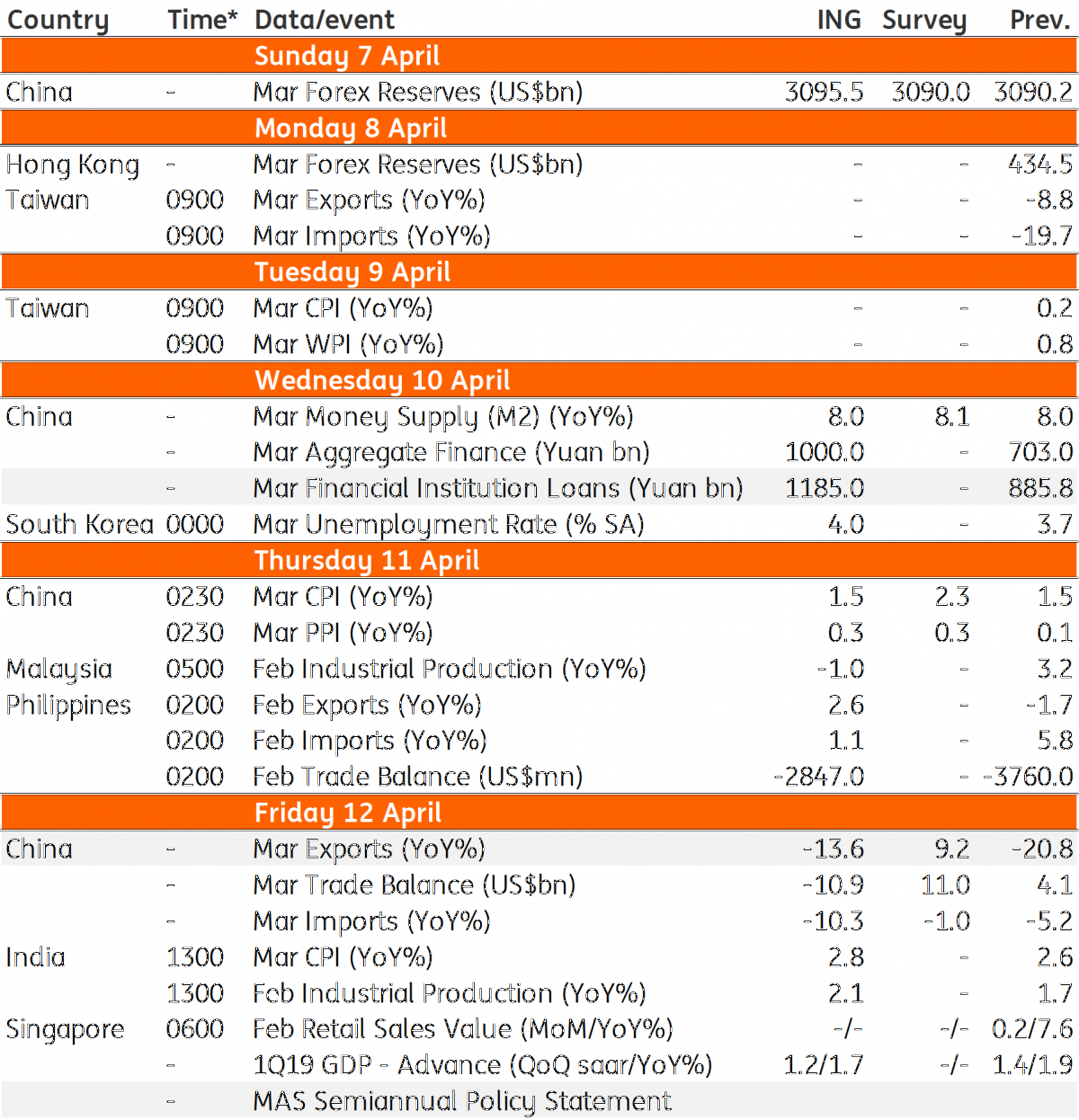Asia week ahead: Singapore central bank to stay on hold
Lots of data coming out of China next week, but export growth will be the one we'll be looking out for. Elsewhere, Singapore's central bank meets, but expect no fireworks
China's fiscal stimulus is working
China's trade, inflation and monetary indicators are due for March, and we expect the numbers will give an undistorted view of the economy as the data from the first two months of the year is affected by the Lunar New Year seasonality. Indeed the most significant will be export growth for what it says about the trade war impact, while lending growth will tell us about the government stimulus.
From the better manufacturing PMI reading, we infer the fiscal stimulus is working and expect hard activity data to reinforce this message.
Singapore - stable policy this year
Singapore's central bank releases its semi-annual monetary policy statement next week, and this comes alongside the advance estimate of GDP growth in the first quarter of 2019.
The Monetary Authority of Singapore tightened policy in April last year, but there is no denying that downside growth risk has intensified since. A sharp plunge in both exports and manufacturing in the first two months of 2019 foreshadowed sharp GDP slowdown in the first quarter. Inflation pressure also has abated, apart from the food component. Headline inflation has been less than 1% for more than four years now, and core inflation, which ticked up to the top end of the MAS’s 1-2% forecast recently, has also started to slow.
With these trends likely getting stronger in 2019, we believe the MAS will prefer to leave policy on hold next week. As such, we expect no change in the MAS's target band for Singapore Dollar Nominal Effective Exchange Rate (SGD-NEER) – no change to the level, the width, or the slope of the band. Our base case is one of stable policy this year.
Asia Economic Calendar

Download
Download article8 April 2019
What’s going on in Australia? This bundle contains {bundle_entries}{/bundle_entries} articles"THINK Outside" is a collection of specially commissioned content from third-party sources, such as economic think-tanks and academic institutions, that ING deems reliable and from non-research departments within ING. ING Bank N.V. ("ING") uses these sources to expand the range of opinions you can find on the THINK website. Some of these sources are not the property of or managed by ING, and therefore ING cannot always guarantee the correctness, completeness, actuality and quality of such sources, nor the availability at any given time of the data and information provided, and ING cannot accept any liability in this respect, insofar as this is permissible pursuant to the applicable laws and regulations.
This publication does not necessarily reflect the ING house view. This publication has been prepared solely for information purposes without regard to any particular user's investment objectives, financial situation, or means. The information in the publication is not an investment recommendation and it is not investment, legal or tax advice or an offer or solicitation to purchase or sell any financial instrument. Reasonable care has been taken to ensure that this publication is not untrue or misleading when published, but ING does not represent that it is accurate or complete. ING does not accept any liability for any direct, indirect or consequential loss arising from any use of this publication. Unless otherwise stated, any views, forecasts, or estimates are solely those of the author(s), as of the date of the publication and are subject to change without notice.
The distribution of this publication may be restricted by law or regulation in different jurisdictions and persons into whose possession this publication comes should inform themselves about, and observe, such restrictions.
Copyright and database rights protection exists in this report and it may not be reproduced, distributed or published by any person for any purpose without the prior express consent of ING. All rights are reserved.
ING Bank N.V. is authorised by the Dutch Central Bank and supervised by the European Central Bank (ECB), the Dutch Central Bank (DNB) and the Dutch Authority for the Financial Markets (AFM). ING Bank N.V. is incorporated in the Netherlands (Trade Register no. 33031431 Amsterdam).
